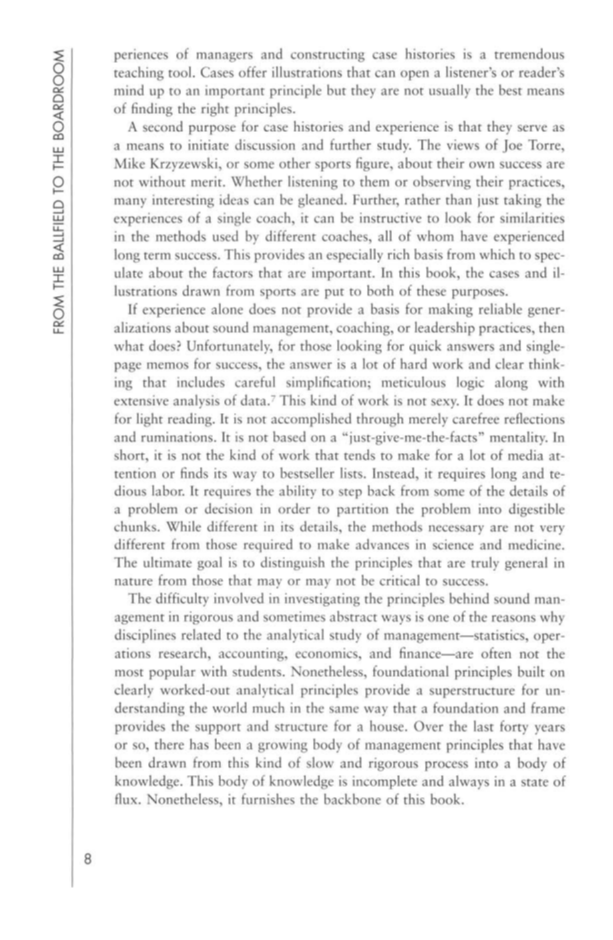periences of managers and constructing case histories is a tremendous teaching tool. Cases offer illustrations that can open a listener's or reader's mind up to an important principle but they are not usually the best means of finding the right principles. A second purpose for case histories and experience is that they serve as a means to initiate discussion and further study. The views of Joe Torre, Mike Krzyzewski, or some other sports figure, about their own success are not without merit. Whether listening to them or observing their practices, many interesting ideas can be gleaned. Further, rather than just taking the experiences of a single coach, it can be instructive to look for similarities in the methods used by different coaches, all of whom have experienced long term success. This provides an especially rich basis from which to spec- ulate about the factors that are important. In this book, the cases and il- lustrations drawn from sports are put to both of these purposes. If experience alone does not provide a basis for making reliable gener- alizations about sound management, coaching, or leadership practices, then what does? Unfortunately, for those looking for quick answers and single- page memos for success, the answer is a lot of hard work and clear think- ing that includes careful simplification meticulous logic along with extensive analysis of data.7 This kind of work is not sexy. It does not make for light reading. It is not accomplished through merely carefree reflections and ruminations. It is not based on a "just-give-me-the-facts" mentality. In short, it is not the kind of work that tends to make for a lot of media at- tention or finds its way to bestseller lists. Instead, it requires long and te- dious labor. It requires the ability to step back from some of the details of a problem or decision in order to partition the problem into digestible chunks. While different in its details, the methods necessary are not very different from those required to make advances in science and medicine. The ultimate goal is to distinguish the principles that are truly general in nature from those that may or may not be critical to success. The difficulty involved in investigating the principles behind sound man- agement in rigorous and sometimes abstract ways is one of the reasons why disciplines related to the analytical study of management—statistics, oper- ations research, accounting, economics, and finance—are often not the most popular with students. Nonetheless, foundational principles built on clearly worked-out analytical principles provide a superstructure for un- derstanding the world much in the same way that a foundation and frame provides the support and structure for a house. Over the last forty years or so, there has been a growing body of management principles that have been drawn from this kind of slow and rigorous process into a body of knowledge. This body of knowledge is incomplete and always in a state of flux. Nonetheless, it furnishes the backbone of this book. 8
Document Details My Account Print multiple pages
Print
You have printed 0 times in the last 24 hours.
Your print count will reset on at .
You may print 0 more time(s) before then.
You may print a maximum of 0 pages at a time.
































































































































































































































































